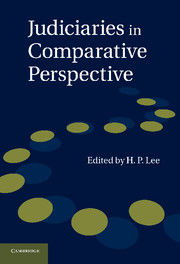Book contents
- Frontmatter
- Contents
- Contributors
- Foreword
- Preface
- Table of cases
- Table of statutes
- Part I
- Part II
- Part III
- 8 Judges’ freedom of speech
- 9 Judges and free speech in Canada
- 10 Judges and free speech in New Zealand
- 11 The judiciary and freedom of speech in South Africa
- 12 Judges and free speech in the United Kingdom
- 13 The criticism and speech of judges in the United States
- Part IV
- Part V
- Part VI
- Index
- References
13 - The criticism and speech of judges in the United States
from Part III
Published online by Cambridge University Press: 07 September 2011
- Frontmatter
- Contents
- Contributors
- Foreword
- Preface
- Table of cases
- Table of statutes
- Part I
- Part II
- Part III
- 8 Judges’ freedom of speech
- 9 Judges and free speech in Canada
- 10 Judges and free speech in New Zealand
- 11 The judiciary and freedom of speech in South Africa
- 12 Judges and free speech in the United Kingdom
- 13 The criticism and speech of judges in the United States
- Part IV
- Part V
- Part VI
- Index
- References
Summary
American judges live in interesting times. A confluence of events, some centuries in the making, others more recent, has put judges at the center of many of the most politically charged disputes in the United States, which has exposed them to withering criticism and proposals to curb their discretion from the political right, to a lesser extent from the political left, and from fringe groups that defy classification. American judges have bemoaned their plight, and with their implicit and sometimes explicit support, state and national bar organizations have created commissions, issued reports, and developed programs aimed at defending judges from attack. Private organizations have emerged to criticize court critics and align themselves with state and federal judiciaries to the end of promoting fair and impartial courts. Faced with opposition from court defenders who decry what they regard as unwarranted threats to the judiciary’s independence, court critics have rejoined that they are merely seeking to promote meaningful judicial accountability to the public that judges serve.
For their part, judges themselves have acquired new, ill-defined rights to speak out on issues of the day, which has liberated them to an as yet uncertain extent from ethics restrictions on their speech and enabled them to respond more effectively to their critics. At the same time, it portends to thrust them further into the political limelight, thereby diminishing the differences that separate judges from public officials in the so-called “political branches” of government, and arguably making them even more inviting targets for their detractors.
- Type
- Chapter
- Information
- Judiciaries in Comparative Perspective , pp. 257 - 276Publisher: Cambridge University PressPrint publication year: 2011
References
- 1
- Cited by

